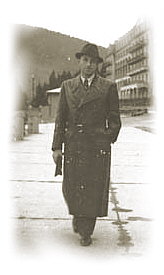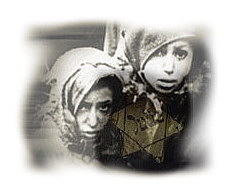

After
WW2 Alois Brunner found gainful employment
courtesy of Reinhard Gehlen and the CIA. Gehlen,
Hitler's top anti-Soviet spy, surrendered to the
Americans and offered his services. CIA took the bait
and Gehlen re-established his spy organization, and
enlisted thousands of Gestapo, Wehrmacht and SS
veterans. During the Cold War Gehlen's network of
agents received millions of dollars in funding from
the U.S. From 1956-68 Reinhard Gehlen was Germany's
Chief of Federal Intelligence Service.
Later
Brunner escaped to Syria where he became a government
adviser. To this day Alois Brunner - now 90 - has
successfully evaded capture. He is believed to live in
Damascus using the name of his cousin Georg Fischer, though in
December 1999, there were unconfirmed reports that he
had died in 1996 and was buried in a Damascus cemetery.

Alois Brunner
But German journalists visiting Syria in 1999 said
Brunner was living at the Meridian Hotel in Damascus
under police protection.
Brunner is easily identifiable, having lost an eye and
several fingers from letter bombs sent him years ago
by French and Israeli security agents.
With
the release of Adolf Eichmann's memoirs, Alois Brunner,
whom Eichmann once called his best man, was
again in the news. Brunner was already
sentenced to death in absentia in France in 1953 and
1954; more recently, a new suit was filed there based
on his sending children to Auschwitz. Previous
attempts to persuade Syria to release Brunner failed.
Germany applied for his extradition in 1987, and in
1991 the European Parliament voted to condemn Syria
for continuing to harbor the alleged war criminal.
In
1995 German State prosecutors in Cologne and Frankfurt
posted a $333,000 reward for information leading to
the arrest of the last leading Nazi still believed to
be on the loose.
Germany, Austria, Slovakia, France and Poland
currently seek his extradition but until now the Syrians have ignored all attempts to
extradite him, including those by Simon
Wiesenthal.

Simon Wiesenthal
The
famous Nazi-hunter and Holocaust survivor Simon
Wiesenthal has made the pursuit of Nazi war criminals
his life's work and has spent more than half his life
doggedly gathering information on the whereabouts of
fugitive Nazis. In his introduction to In
the Lion's Mouth by Joan Campion he
writes:
"As
these words are written, Alois Brunner, perhaps the
most outstanding surviving Nazi war criminal, is
living as a free man in Damascus, Syria. Human justice
did not get to this man. He committed his crimes not
only in Slovakia, but also in Austria, France, Greece,
and Yugoslavia, yet he has nothing to fear. All
attempts to have him extradited have been refused. It
seems that in Syria the murder of Jews is not a crime."
Brunner
was interviewed about 15 years ago in the Austrian
news magazine Bunte. He said he did not suffer
from a bad conscience for, in his own words, "getting
rid of that garbage." His one regret was
that he hadn't murdered more Jews.

In 1987 in a
telephone interview Alois Brunner told the Chicago Sun Times:
"The
Jews deserved to die. I have no regrets. If I had the
chance I would do it again .."